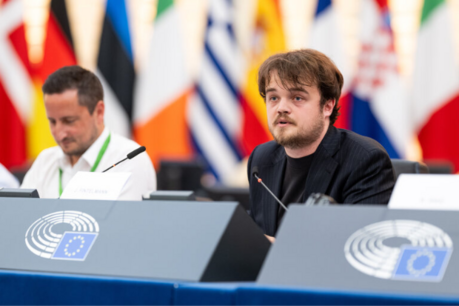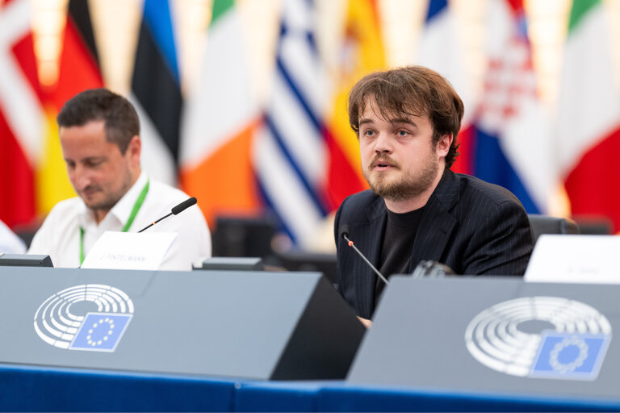
Julius Fintelmann (right) founder of The European Correspondent speaking at the European Youth Event on 14 June 2025
Credit: European Union 2025
It’s been five years since the UK left the EU, and nine years since the Brexit vote. So what kind of EU has Britain left behind – and how are journalists covering it?
Here’s the surprising twist: Brexit actually helped create a more united EU. European readers and politicians now want to see the European project succeed more than ever. At the same time, traditional ways of making money from news – advertising and grants – have become unreliable.
This creates a perfect opportunity for news outlets willing to bet everything on building direct relationships with engaged European readers.
Bottom line: The outlets convincing readers to pay for solutions-focused European coverage have the best shot at survival.
The veterans: Learning hard lessons
EUobserver shows how tough this transition can be. As one of the first digital EU news sites, it’s celebrating 25 years of covering European policy through a human rights lens. Despite having just eight staff members, this non-profit has built a solid reputation.
The outlet focuses on stories that don’t get much coverage elsewhere because there’s no industry money behind them – things like rule of law, workers’ rights, transparency, migration, and climate policy. They recently made headlines with a Gaza human rights report that was shared with EU Foreign Ministers but then quietly buried.
The money reality: Right now, EUobserver gets 40 per cent of its revenue from memberships, 30per cent from advertising, and 30per cent from foundations. But they want to be 80 per cent reader-funded by 2027.
Why the shift? Foundation funding is drying up. USAID has been cut, foundations are changing how they give money, and market troubles mean less foundation spending overall.
“Reader revenue seems to be the only way a small publication like ours can survive,” says publisher Alejandro Tauber. “It keeps us independent and protects us from huge revenue swings.”
With 400-450,000 monthly visitors and member growth of 4-5 per cent each month, they’re building an audience willing to pay for journalism that matches their values.
The pure play: Skipping traditional revenue entirely
Sacha Cayre, chief marketing officer at Contexte, speaking at The Audiencers Festival on 24 June 2025
French outlet Contexte represents a new breed of European news organisations. They cover European and French policy, but here’s what’s different – they’re subscription-only with zero advertising by design.
In March 2025, Contexte entered what they call their “modular era,” letting readers choose how deep they want to go with policy content. They just launched their first English section, Contexte ENERGY, focusing on EU climate policy.
The numbers: More than 12,000 EU decision-makers subscribe, representing some 1,600 organisations. Two thirds pay extra to “go beyond the essentials” – these are sophisticated users who need to track every legislative detail for their jobs.
The outlet offers two main products behind the paywall: Contexte Directory (profiles of all 719 MEPs and their legislative amendments with search tools) and Contexte Briefing (daily policy updates).
“We’re thinking a lot about bridges and structured pathways,” says chief marketing officer Sacha Cayre. “Public policy moves slowly and our audience thinks long-term.”
They’re working on AI tools to scan transcripts, though early results show new subscribers like this more than existing ones.
Contexte Directory, profiling MEP Francois-Xavier Bellamy
The experiment: EU funding as a bridge
The European Correspondent might be the most ambitious reader-funded journalism experiment in Europe.
Built by 340+ unpaid journalists over two years, the organisation just secured €2.16 million in EU grant funding for 2025-2027. This will help them transition from a volunteer newsletter to a real Brussels office with paid staff.
The grant will fund expansion from English into six new languages: German (November 2025), then French, Spanish, Italian, Polish, and Ukrainian in 2026. They’re also building a new website and ramping up video content.
Their storytelling approach: They plot stories on a grid of impact versus entertainment. Examples include direct impact stories (Georgians possibly losing visa-free travel), cross-border patterns (farmer protests spreading from the Netherlands), and solutions journalism (Spanish cities solving urban heating).
Their readers generally care about climate action, humane treatment of migrants, and economic justice.
The big test: By mid-2027, when the EU grant ends, they need to hit €1 million in annual revenue to survive independently.
“We are very critical of the European Union and I am personally extremely critical of the EU,” says editor-in-chief Julius Fintelmann. “I think we’re better off with than without, that’s for sure. But it’s far from perfect.”
The exception: When old models still work
The Parliament Magazine proves there are still exceptions to the reader-revenue rule.
Celebrating 30 years in 2025, this Brussels publication sticks with traditional advertising and events because it has something unique – direct access to MEPs.
They print 3,000 copies monthly and distribute them free to European institutions, plus reach 68,000 digital users. Their coverage looks for fresh angles, like examining France’s discussions about banning social media for under-16s following Australia’s lead.
Why it works: According to their surveys, 82 per cent of readers trust the magazine, 69 per cent consider it “critical,” and 72 per cent say it helps them do their jobs. Politicians use it for a competitive advantage – to challenge assumptions and inform their legislative work. Readers also make for valuable interviewees and provide story leads.
The limits: While they make money from subscriptions, advertising, and events (they run summits on health, sustainability, and tech), they face growing competition from better-funded rivals and pressure to move from personality-focused to issues-based journalism.
“MEPs want to stand out to their colleagues, they want informed discussions and they want to challenge preconceived notions,” says editor Matthew Lynes, adding that this helps them push for better legislation that will actually make an impact.
This article was drafted with the help of Claude AI before it was edited by a human
Free daily newsletter
If you like our news and feature articles, you can sign up to receive our free daily (Mon-Fri) email newsletter (mobile friendly).
